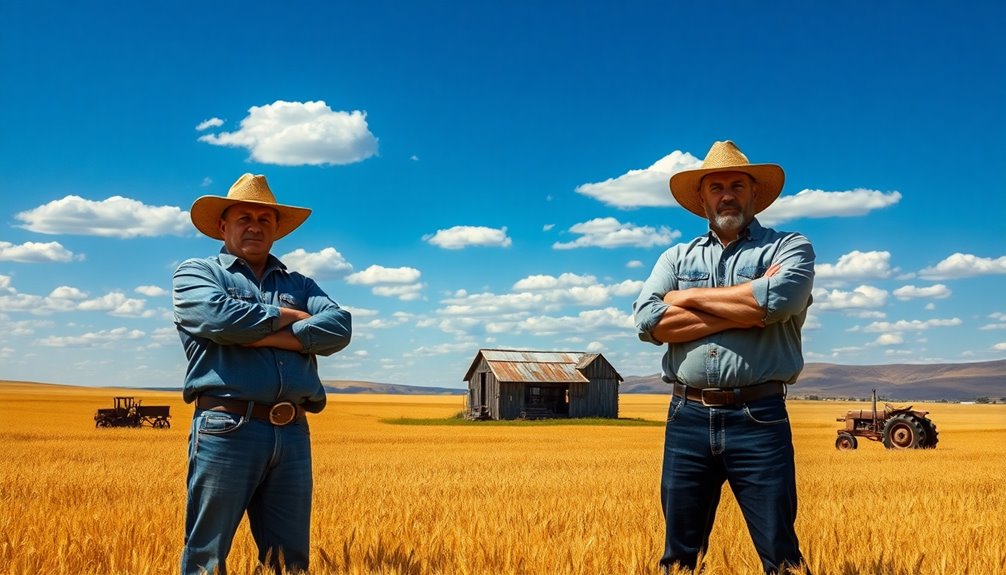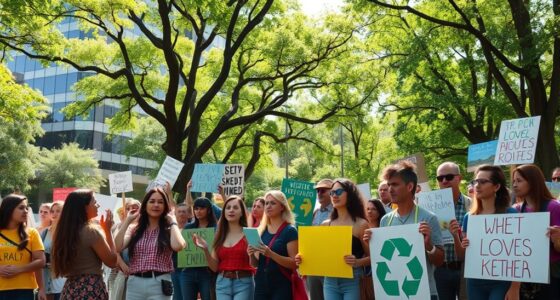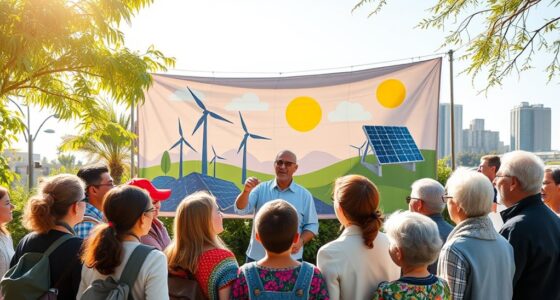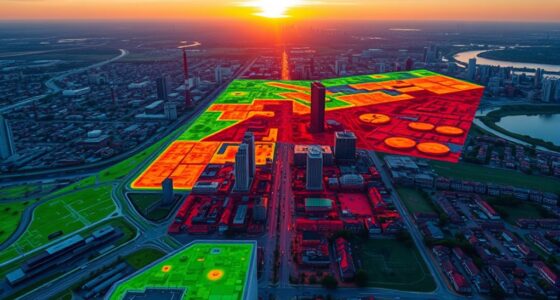Farmers in Kansas and Missouri are increasingly aware of climate change's impact on their livelihoods, but many avoid discussing it. Fear of conflict and strained relationships within their communities keeps them silent. Politicization of climate issues adds to the discomfort. While some farmers implement sustainable practices like using drought-resistant crops, the lack of open conversations hinders collective problem-solving. Discovering the real stories behind this silence reveals important insights about farming in today's changing climate.
Key Takeaways
- Farmers in Kansas and Missouri often avoid climate discussions due to fear of damaging relationships with customers and neighbors.
- The politicization of climate change creates a charged atmosphere, making conversations uncomfortable for many farmers.
- Economic concerns overshadow climate change discussions, with farmers prioritizing financial stability over environmental dialogue.
- Many farmers recognize climate change's impact on operations but remain silent due to the "spiral of silence" theory.
- Despite the reluctance to discuss climate change, some farmers are quietly adopting sustainable practices to adapt to environmental changes.
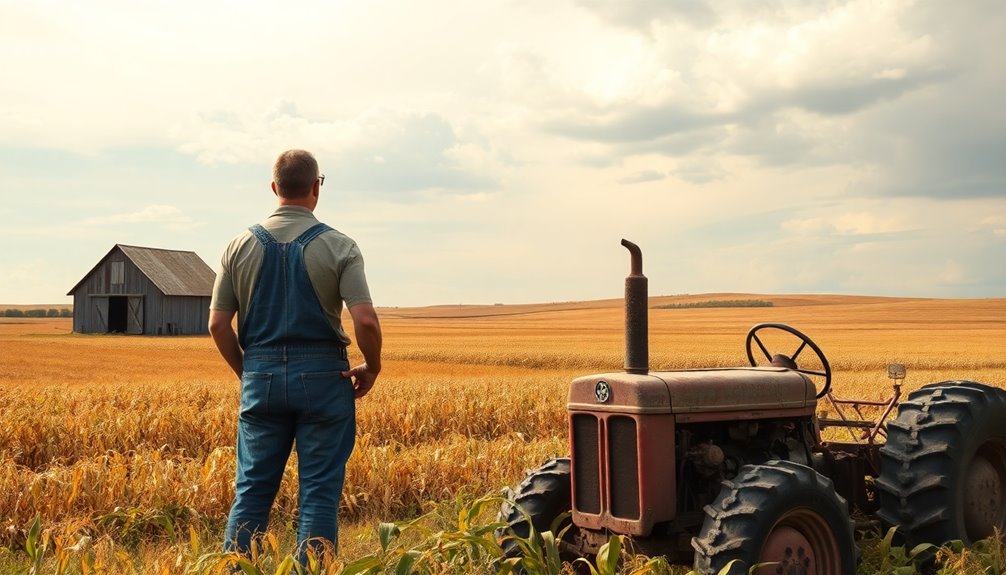
As climate change increasingly disrupts farming in Kansas and Missouri, many farmers recognize its reality but hesitate to discuss it openly. You see firsthand the challenges that arise from shifting weather patterns and extreme events, yet the fear of conflict and potential harm to your livelihood keeps you silent.
The politicization of climate change adds another layer of complexity, making conversations feel charged and uncomfortable. This reluctance isn't just personal; it's a reflection of the "spiral of silence" theory. If you think your views on climate change aren't shared by others, you might choose to stay quiet.
Economic worries also weigh heavily on your mind. You might fear that speaking out could damage relationships with customers or neighbors, especially in a politically divided environment. Trust in media is shaky, too, leading to skepticism about public opinion and further discouraging open dialogue.
You experience the effects of climate change daily. Rising temperatures and erratic weather patterns disrupt your farming operations, impacting crop yields and livestock productivity. Traditional planting schedules are in flux, forcing you to adapt your strategies. In fact, agriculture accounted for 10.5% of U.S. greenhouse gas emissions in 2022, highlighting the dual role of farmers as both victims and contributors to climate change.
Soil degradation and increased pest pressures challenge your ability to maintain healthy ecosystems. Moreover, the silence surrounding these issues hampers collective problem-solving. If you and your fellow farmers don't share experiences and strategies, you might miss out on vital solutions to adapt and mitigate the impacts of climate change.
The economic stability of your rural community hangs in the balance, as agricultural productivity decreases due to these environmental changes. Despite the reluctance to speak out, many farmers in Kansas and Missouri are quietly implementing sustainable practices.
You might be using drought-resistant crops, water conservation techniques, and diversifying your planting to better cope with shifting seasons. These efforts are essential, but without open conversations, the community's ability to adapt and thrive could be at risk.
The time for discussion and collaboration is now, even if it feels daunting.
Frequently Asked Questions
What Crops Are Primarily Grown in Kansas and Missouri?
In Kansas, you'll find corn, wheat, sorghum, soybeans, and sunflowers dominating the agricultural landscape. The state leads in winter wheat and sorghum production.
Missouri, on the other hand, primarily grows soybeans and corn, with additional crops like cotton, hay, and various grains.
Each state showcases its unique strengths, with Kansas focusing on diverse crops and Missouri emphasizing soybean and corn cultivation.
You'll see these crops playing vital roles in both states' economies.
How Do Weather Patterns Affect Farming in These States?
Weather patterns significantly impact farming in Kansas and Missouri.
You'll notice that drought reduces crop yields and livestock feed availability, while extreme heat can disrupt pollination.
Soil erosion becomes a concern with increased extreme weather events, threatening long-term soil health.
To counter these challenges, you might consider adopting sustainable practices, like crop rotation and precision agriculture, which help optimize resources and maintain productivity despite shifting climate conditions.
What Are the Main Challenges Faced by Farmers in This Region?
Did you know that net farm income in Kansas is projected to drop by 21% in 2024?
This steep decline highlights the main challenges you face as a farmer, including rising production expenses, climate change impacts, and market pressures from larger operations.
You might struggle with adapting to shifting weather patterns and dealing with mental health issues, all while trying to maintain the viability of your farm and community.
Are There Any Government Programs Supporting Local Farmers?
Yes, there are several government programs supporting local farmers.
You can access grants like the Beginning Farmer and Rancher Development Program, which helps you gain essential skills.
The Farmers Market and Local Food Promotion Program enhances your direct-to-consumer marketing.
If you're focusing on sustainability, the Environmental Quality Incentives Program offers cost-share payments for conservation practices.
Additionally, microloans can assist with operating expenses, making it easier for you to grow your farm.
How Do Farmers in Kansas and Missouri Adapt to Changing Market Demands?
Farmers in Kansas and Missouri adapt to changing market demands by diversifying crops and exploring new sales channels, like farmers markets.
They often seek training and technical assistance to enhance their marketing strategies. By collaborating with local initiatives, they strengthen their position in the food system.
Additionally, many are considering value-added opportunities, like creating processed products, to meet consumer preferences and boost their income while ensuring sustainability in their practices.
Conclusion
So, while farmers in Kansas and Missouri dodge climate talks like a game of dodgeball, you've got to wonder: are they just waiting for the weather to change its mind? With corn and soybeans as their trusty sidekicks, they might think Mother Nature's just playing hard to get. Who needs science when you've got a tractor and a prayer? Let's hope their crops aren't as stubborn as their conversation choices. After all, denial's not just a river in Egypt!
